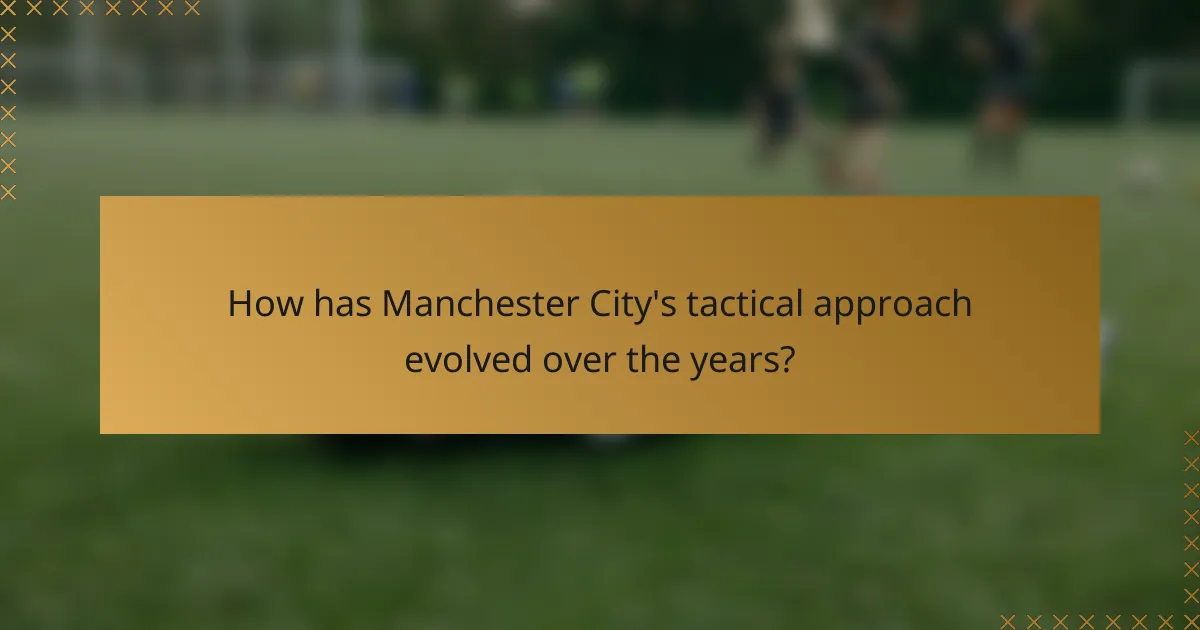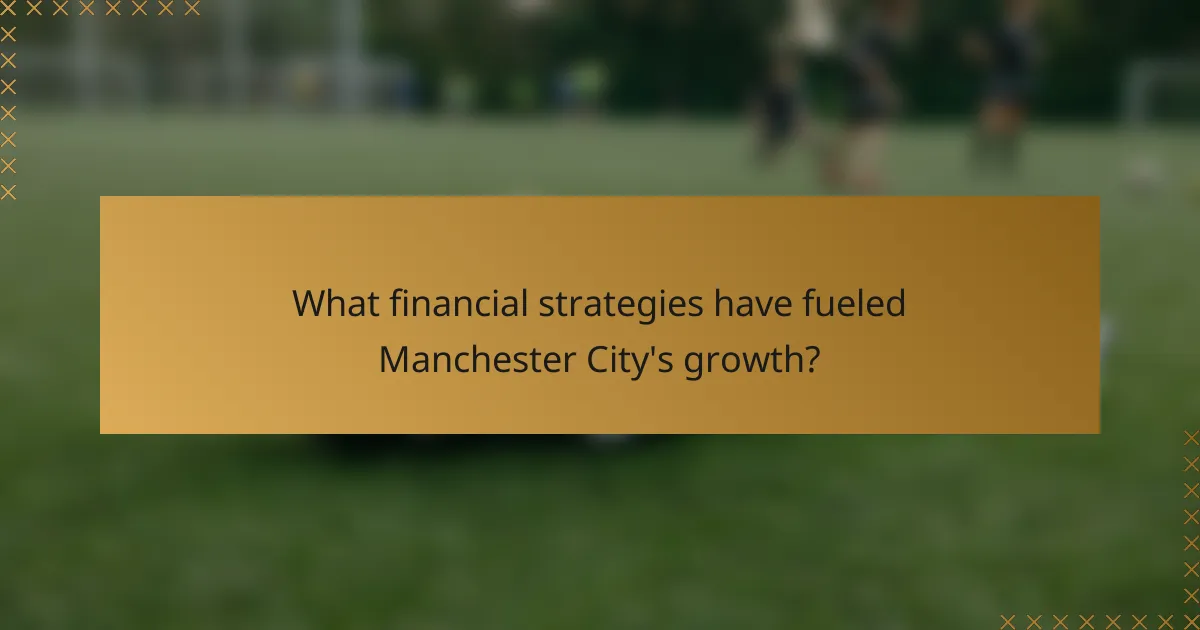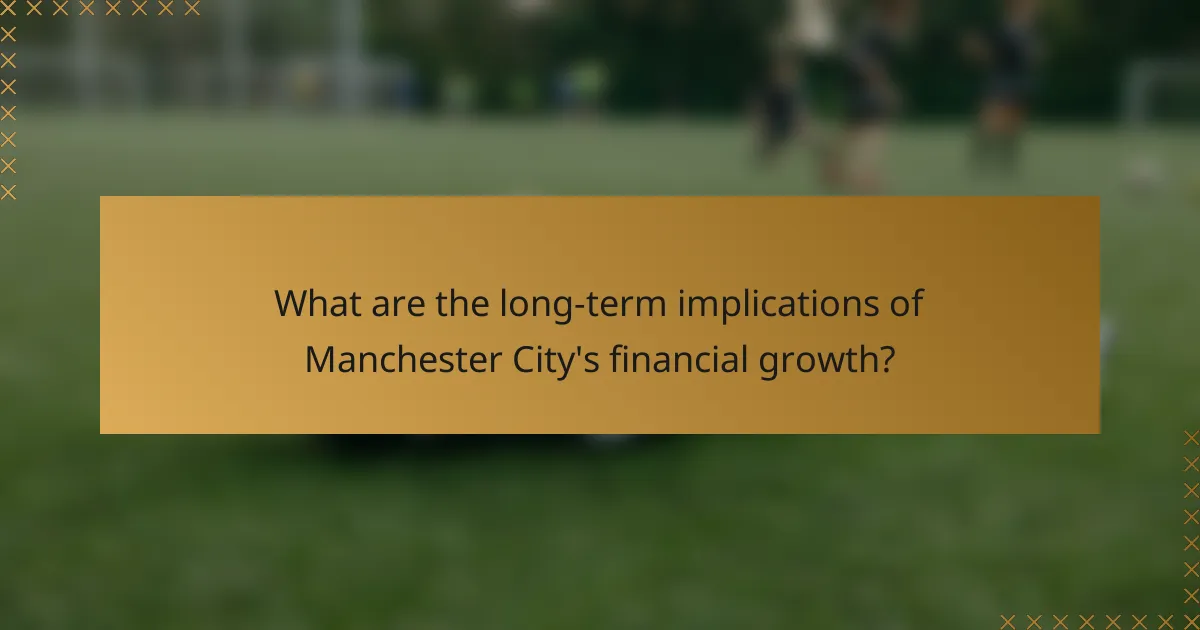Manchester City’s rise in football showcases a blend of tactical evolution, standout players, and substantial financial growth. The team’s strategic shift emphasizes possession-based football and pressing. Key players like Erling Haaland and Kevin De Bruyne drive this dynamic style. Financial investments have bolstered talent acquisition, enhancing the club’s competitiveness and brand expansion.

How has Manchester City’s tactical approach evolved over the years?
Manchester City’s tactical approach has evolved significantly, focusing on possession-based football and pressing strategies. Initially, under Roberto Mancini, the team emphasized a solid defensive structure. With Manuel Pellegrini, they adopted a more attacking style, prioritising fluid movement and creativity. The arrival of Pep Guardiola marked a transformative phase, introducing intricate positional play and high pressing, leading to record-breaking performances. Key players like Kevin De Bruyne and Raheem Sterling have been instrumental in executing this dynamic style. Financial growth has supported talent acquisition, enhancing their tactical flexibility and depth.
What are the key phases of tactical changes in Manchester City?
Manchester City’s tactical evolution involves several key phases: the introduction of possession-based play, the transition to high pressing, and the integration of versatile players. These phases reflect a strategic shift aimed at maximizing performance and adapting to different opponents. The club’s financial growth has facilitated the acquisition of top talent, enhancing tactical flexibility and depth. Key players like Kevin De Bruyne and Erling Haaland have significantly influenced these tactical changes, contributing to a more dynamic style of play.
Which managers have influenced Manchester City’s tactical evolution?
Pep Guardiola is the most influential manager in Manchester City’s tactical evolution. His arrival in 2016 marked a significant shift towards possession-based football and high pressing. Guardiola implemented a fluid style that emphasized positional play, transforming the team’s approach and success. Other notable figures include Roberto Mancini, who laid the foundation for tactical development, and Manuel Pellegrini, who introduced a more attacking philosophy. Each manager contributed to the club’s tactical identity, leading to sustained success in domestic and European competitions.
How do Manchester City’s tactics compare to other top clubs?
Manchester City’s tactics emphasize possession-based play, high pressing, and positional interchange, setting them apart from other top clubs. Their approach focuses on fluidity and adaptability, allowing for quick transitions and exploiting defensive weaknesses.
Compared to clubs like Liverpool and Bayern Munich, Manchester City maintains a greater emphasis on ball control and tactical flexibility. Liverpool’s tactics lean towards counter-pressing and rapid transitions, while Bayern Munich often relies on width and pace.
Key players such as Kevin De Bruyne and Erling Haaland enhance City’s tactical execution, providing creativity and finishing prowess. This combination of strategy and talent has contributed to their recent successes, including multiple league titles.
Financial growth supports City’s tactical evolution, enabling investments in top-tier talent and advanced training facilities. This financial backing distinguishes them from clubs with more limited resources, allowing for sustained competitive advantages.
What role does player versatility play in Manchester City’s tactics?
Player versatility is crucial in Manchester City’s tactics, enabling fluid formations and dynamic gameplay. Versatile players like Kevin De Bruyne and Bernardo Silva can adapt to multiple roles, enhancing the team’s attacking and defensive capabilities. This adaptability allows for strategic flexibility, making it difficult for opponents to predict City’s movements and formations. As a result, Manchester City can maintain high possession and create diverse attacking options, contributing significantly to their tactical evolution and success.

Who are the standout players in Manchester City’s current squad?
The standout players in Manchester City’s current squad include Erling Haaland, Kevin De Bruyne, and Rodri. Erling Haaland leads the attack with exceptional goal-scoring ability, boasting a record of 25 goals in the current season. Kevin De Bruyne serves as a creative force, providing numerous assists and dictating play from midfield. Rodri is pivotal in defence, offering stability and control in the centre of the pitch. Each player significantly contributes to the team’s tactical evolution and overall success.
What impact have key signings had on Manchester City’s success?
Key signings have significantly boosted Manchester City’s success by enhancing their tactical flexibility and depth. Notable players like Kevin De Bruyne and Erling Haaland have transformed the team’s attacking capabilities, contributing to multiple titles. The financial investment in these key players has yielded a strong return, with increased performance metrics and overall team cohesion. This strategy has positioned Manchester City as a dominant force in both domestic and European competitions.
How do homegrown talents contribute to Manchester City’s identity?
Homegrown talents significantly shape Manchester City’s identity through their contributions to the team’s style and success. Players like Phil Foden and Cole Palmer embody the club’s commitment to youth development. Their integration into the first team highlights a unique attribute of Manchester City’s strategy, emphasizing local talent alongside high-profile signings. This blend fosters a strong connection with fans and enhances the club’s community image. As a result, homegrown players not only bolster the squad but also reinforce the club’s values and legacy.
Which players are considered game-changers for Manchester City?
Kevin De Bruyne and Erling Haaland are considered game-changers for Manchester City. De Bruyne’s playmaking ability significantly influences matches, while Haaland’s goal-scoring prowess transforms offensive strategies. Their unique attributes enhance the team’s tactical evolution and financial growth, making them indispensable assets.

What financial strategies have fueled Manchester City’s growth?
Manchester City’s growth has been fueled by strategic investments, smart player acquisitions, and effective management. The club’s transformation began with significant financial backing from the Abu Dhabi United Group in 2008, which enabled high-profile signings and infrastructure improvements.
Key players like Sergio Agüero and Kevin De Bruyne have been instrumental, contributing to on-field success that translates into increased revenue through ticket sales and merchandise. Additionally, the club’s focus on youth development has produced talents like Phil Foden, enhancing both the squad and financial sustainability.
The implementation of data analytics in player recruitment and performance analysis has distinguished Manchester City, allowing them to make informed decisions that optimize their investments. This combination of financial acumen and tactical innovation continues to drive their growth in the competitive landscape of football.
How has sponsorship impacted Manchester City’s financial landscape?
Sponsorship has significantly strengthened Manchester City’s financial landscape, enhancing revenue streams and global brand visibility. Strategic partnerships, such as with Etihad Airways, have contributed to substantial income, allowing for investment in player acquisitions and facilities.
In the 2022-2023 season, Manchester City reported a revenue increase of over 20%, largely driven by sponsorship deals. These financial gains have facilitated a tactical evolution, enabling the club to attract key players and improve competitive performance.
The club’s unique approach to sponsorship, focusing on long-term relationships and brand alignment, sets it apart in the football industry. As a result, Manchester City has transformed into a financial powerhouse, leveraging sponsorship to sustain growth and success.
What role do player transfers play in Manchester City’s financial strategy?
Player transfers are crucial to Manchester City’s financial strategy as they enhance team performance and generate revenue. By acquiring high-profile players, the club boosts merchandise sales and increases ticket demand. Additionally, strategic sales of players can yield significant profits, contributing to overall financial stability. The club’s investment in talent reflects its commitment to maintaining competitive advantage while adhering to financial regulations. This approach supports sustainable growth and reinforces Manchester City’s status in global football.
How does Manchester City’s financial model compare to other clubs?
Manchester City’s financial model is among the most advanced in football, emphasizing sustainable growth and strategic investments. Compared to clubs like Manchester United and Barcelona, City relies on diversified revenue streams, including commercial partnerships and matchday income.
City’s ownership by the City Football Group allows for significant financial backing, enabling high-profile player acquisitions and infrastructure development. This contrasts with clubs facing financial constraints or heavy debt.
Additionally, City’s focus on youth development and analytics enhances its competitive edge, making its financial model not just about spending but smart investments. This approach positions City uniquely in the evolving landscape of football finance.

What are the long-term implications of Manchester City’s financial growth?
Manchester City’s financial growth has significant long-term implications, including enhanced competitiveness and global brand expansion. Increased revenue allows for higher player acquisition budgets, which attracts top talent. This creates a cycle of success on the pitch, further boosting financial performance. Additionally, the club’s investments in infrastructure, such as training facilities, support sustainable growth and community engagement. Ultimately, financial stability positions Manchester City as a dominant force in football, influencing market dynamics and setting industry standards.
How does financial growth affect Manchester City’s competitive edge?
Financial growth significantly enhances Manchester City’s competitive edge by enabling investment in top talent and advanced training facilities. Increased revenue streams from sponsorships and broadcasting rights allow for strategic player acquisitions, strengthening the squad. This financial backing also supports the club’s tactical evolution, facilitating the implementation of innovative strategies. Moreover, Manchester City’s financial power creates a unique attribute in the Premier League, attracting elite players and coaching staff, which further solidifies their position as a dominant force.
What challenges does Manchester City face in maintaining financial success?
Manchester City faces several challenges in maintaining financial success, including compliance with financial regulations, competition for player talent, and the need for sustainable growth. Financial Fair Play regulations impose strict limits on spending, requiring careful financial management. Additionally, fierce competition from other top clubs can drive up player acquisition costs, affecting budget allocation. Lastly, balancing short-term success with long-term financial stability remains a critical concern for the club’s management.
What best practices can be learned from Manchester City’s financial strategies?
Manchester City’s financial strategies emphasize sustainable growth and strategic investment. Key practices include transparent financial reporting, diversification of revenue streams, and prudent player acquisitions. These approaches ensure long-term stability and competitive advantage in the football market. The club’s unique attribute lies in its ability to leverage data analytics for player performance and financial decisions, enhancing both on-field success and off-field profitability. As a result, Manchester City serves as a model for effective financial management in sports.
